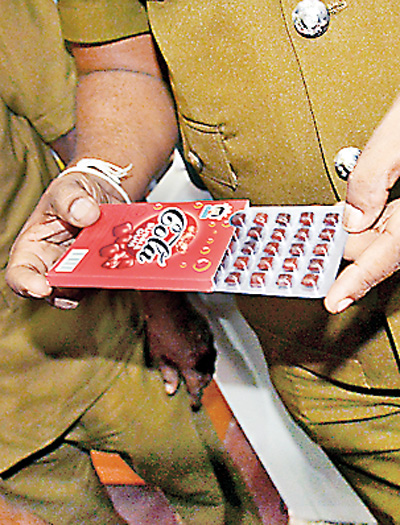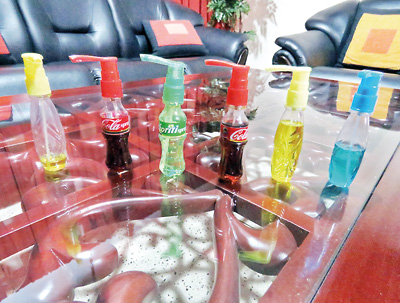News
School kids sucked into addiction through laced ‘soft drinks’
A drink being sold outside schools to students contains a heavy dose of a chemical aimed at drawing the children into hard drugs, and health inspectors have been ordered to seize all stocks and charge the vendors. Reports are coming in from around the country of schoolchildren being lured into the drug habit through drinks and sweets laced with narcotics and even through medical drugs intended for people who are mentally disturbed.

Police display tablets that are dissolved in the drinks. Pix by M.A.Pushpakumara
A statement issued on Friday by the Health Ministry said a drink called Spray Cola was being sold near schools and other venues, “primarily targeted at schoolchildren”.The Director-General of Health Services, Dr. Palitha Maheepala said the drink was an intoxicant and tests this week revealed it contained a large dose of an unknown chemical.
Samples of the drink have been sent to the Government Chemist and the Industrial Technology Institute to ascertain the chemical and its effects. Dr. Maheepala said the drink’s vendors were attempting to get schoolchildren addicted to drugs and advised parents to play close attention to what their children consume and with whom they associate.
Investigations have begun to find the drink’s importers. Spray Cola and another drink called Spriti Spray, bearing labels similar to that of popular legal drinks, are being sold mostly near schools not only in Colombo but also in Kegalle, Kandy, Galle, Anuradhapura and Ampara.
The so-called “soft drinks”, sold at Rs 25 each, are widely available near private tuition classes, schools and near playgrounds where children gather. The bottles have lids designed as a spraying device. Students spray the contents inside their mouth. The Consumer Affairs Authority, Municipal Council and police this week raided shops and sent samples separately to the Government Analyst, City Analyst and Dangerous Drugs Control Unit.
Officials who first noticed the drinks suspected they contained hallucinogenics because children who used it had shown signs of seeing hallucinations and drowsiness as well as signs of addiction. The string of raids found that in addition to the “soft drinks” there were sweets, energy drinks and medicines for sale, all believed to contain substances that cause hallucination or effects similar to those caused by taking narcotics.
Last Sunday, police raided a shop sited in front of a school near Negombo and found 4,510 pills of a sort prescribed for the mentally disturbed. The pills were mainly sold to schoolchildren and drug users as a substitute for narcotics. Police said the pills were believed to be bought through underhand dealings with people connected to the health services as well as through falsely created prescriptions.
In Kotakethenna, in the Ratnapura district, police found chewing gum suspectedto contain drugs as well as a powdery substance to be dissolved in water introduced to students by shopkeepers near schools. Children say when questioned that they use the substances because they believe they reduce stress, the Chairman of the Dangerous Drugs Control Board, Dr Chamira Nilanga Samarasinghe, said.
Most students who used drugs had given up on school education, he said. Most had been neglected at home before falling into the habit of taking drugs. Many of them had both parents away from home. Dr. Samarasinghe warned parents as well as school teachers to pay attention to children.
Dr. Samarasinghe said schoolchildren have been found in possession of cannabis, babul, tobacco and an ayurvedic treatment used as a drug and commented that the high sugar level and carbon dioxide in most soft drinks could increase as well as speed up the reaction of narcotics already taken.
“We have found children eating tobacco leaves in classrooms to get high while drink is used as an amplifier,” he said. “Though there are no drugs involved in some products, most children who take the drinks imagine that they’ve got high and show signs of hysteria,” he added.
CMC Chief Medical Officer Dr. Ruwan Wijayamuni said other suspect drinks could contain a cocktail of steroids, anabolic components and high sugar content which could cause diabetic conditions, hypotension and long-term diseases”.
Biscuits, candy sticks and other drinks come into the country unchecked because they were carried in passenger baggage, he said.
A Health Ministry official said Customs needed to check imported food and beverages as only items listed under the Food Act could be imported into the country
The Consumer Rights Protection National Organisation said it had informed police some time ago that food containing drugs was being sold near schools but action had not been taken.

Laced ‘soft drinks’ displayed for sale
The organisation’s chairman, Ranjith Vithanage, said although the Food Act and Dangerous Drugs Act existed, government authorities had not taken action to implement these laws to stop drugs being introduced to children through drinks and sweets.
“Unidentified food products as well as unlabelled items without proper information on ingredients are banned from sale inside schools but that regulation is not implemented with food sold near schools,” he said.
Consumer Affairs Authority (CAA) Director Chandrika Thilakarathna said those selling the drinks would be also charged with violating laws relating to proper labeling. She said the expiry date, manufacture date, importer and distributer as well as ingredient information must be included in two languages. However this information does not appear in the label of the products.
Ms Thilakarathna said the product name was misleading and action would be taken against vendors for misleading consumers over the identity of the products.

